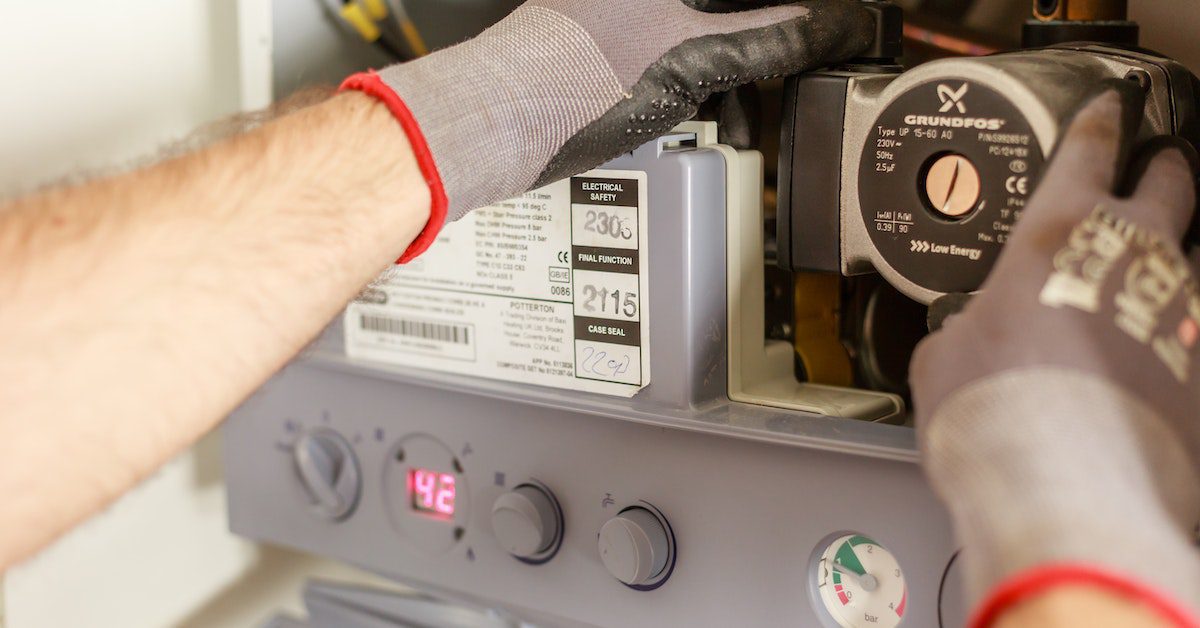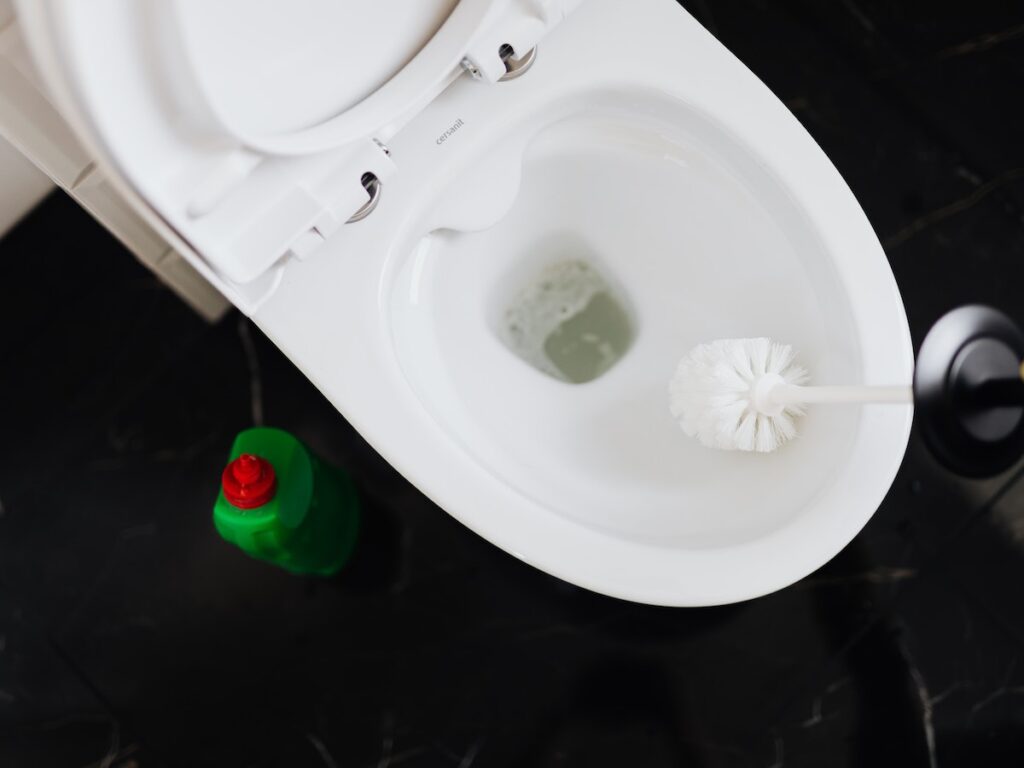Normal business hours are also typically observed by emergency plumbing services. However, plumbing emergencies rarely happen at a convenient time. You should use discretion when selecting whether or not to hire an emergency plumber. In this article, we’ll show you the signs that indicate you need immediate assistance from an emergency plumber.
What is Considered a Plumbing Emergency?
1. Gas Leaks
Gas leaks are probably one of the most urgent plumbing emergencies that could happen in your home. It’s so urgent that companies must add chemicals like mercaptans to natural gas to make it smell because the gas itself has no odour. This produces the familiar gas odour that alerts us to a gas leak and helps us pinpoint its source.
If you hear a hissing or whistling sound near a gas line, it could be a sign of a gas leak. Check to see if a cloud is forming nearby, too. Additionally, look carefully at the flames coming out of your stove or furnace. If they aren’t blue, there’s a problem with the ventilation.
Gas leaks can also cause a lot of health-related symptoms. If you’re already feeling any of the below symptoms, you’re probably already been exposed for a long period of time:
- Dizziness
- Headaches
- Lightheadedness
- Difficulty Breathing
- Ringing in your ears
- Blistering or pale skin
- Nosebleeds
- Irritated Eyes
- Irritated Skin
The severity of these symptoms is still rather low. Constant exposure to the gas can cause serious health problems or even death. If you observe any of these, it’s time to call an emergency plumber. Waiting will save you money, but at the expense of your life and the lives of your loved ones.
2. Water Leak
Water leaks are not always an urgent matter. But if you notice any major leaks, you should get in touch with an emergency plumber straight away.
The stability of your house can be jeopardized by water seepage and flooding. Not all leaks make a sound. Sometimes, even, you will not discover the problem until it’s already caused significant structural damage to your house.
Health problems from mould and mildew growth are another possibility. It can trigger asthma attacks, irritated eyes, and other respiratory issues.
Water damage poses a fire risk because it can cause electrical wires to become wet. As a result, wires and circuits may become overheated and short out. All of these situations call for immediate attention in the event of a water leak. If there are any telltale indicators of severe leaking, you’ll know this is an emergency.
If you’re experiencing severe flooding that has led to a flood, try to turn off the water supply after you’ve called an emergency plumber. Turning off the water is the first step in preventing more damage from a leak. Most homes include a stop cock or stop valve in the kitchen or bathroom that may be used to rapidly turn off the water supply.
After the water supply, make sure to turn off the electricity (if it is safe to do so) and the gas to your home if there is a significant amount of water inside.
3. Overflowing Toilet
A clogged or blocked drain that prevents a proper flush, a poorly adjusted float that allows the tank to overfill, or a blocked vent pipe that refills air in the pipe after each flush are some of the most common causes of an overflowing toilet. In all cases, dealing with this overflowing toilet is a major nightmare.
Note that this is different from a toilet that won’t flush. A plunger or toilet auger will solve a simple clogged toilet. If you’re going to use a plunger, get one with a flange so it can form a good seal with the bowl. If the toilet isn’t flushing properly, try plunging it several times to release any debris that could be blocking the drain.
If your toilet is overflowing, immediately call an emergency plumber. Before your plumber comes, do not, at any cost, try to flush the toilet again. Look for the water pipe running from the wall of your bathroom to the toilet with a hand-crank valve installed along the route. If you can’t find this part, the valve for your toilet may be concealed under the wall or floor tiles — in this instance, you’ll need to consult a plumber about making the necessary adjustments.
The only way to completely stop the flow of water in a toilet is to turn off the water supply to the fixture.
4. Backed-Up Sewage
Backed-up sewage is detectable by olfactory means. The smell of raw sewage is a dead giveaway that there is a backup in the sewer system.
Water backing up in other drains is another indicator of a sewage backup. When you flush the toilet, water may unexpectedly flow up the kitchen sink. When you take a shower, water may pool in an unexpected place.
This is an emergency because it poses a significant threat to human health, much like a gas leak. Some of the symptoms of a sewage blockage include nausea, vomiting, fever, and diarrhea.
When sewage begins to back up into your home’s drains, it’s time to call a sewer repair service or emergency plumbing service. Avoid the affected areas at all costs and keep your loved ones far away. Turn off the water to all of the sinks and toilets in your house.
5. Loss of Water
Unless there’s a government announcement of water interruptions, when you have no running water, call an emergency plumber immediately. It’s not as life-threatening as the other issues above, but it’s still a major pain.
This could count as an emergency because nothing you do, from cleaning dishes to using the bathroom to making or eating food to tending to plants, is allowed. You can’t even use the bathroom.
6. Roof and Gutter Leaks
Plumbers don’t only work on pipes and indoor issues. They also work on roofing and gutter leaks. Now more often than not, roofing is sturdy, yet it can still be damaged. Constant exposure to the environment will eventually wear it down (especially if no preventative maintenance is performed). Damage to your roof, such as cracking or leaking, is possible.
When water seeps into the ceiling cavity due to a leaking roof, it can rot the ceiling and the timbers supporting it. This can significantly reduce the structural integrity of your house.
At the same time, water in the basement, foundation damage, and mould and mildew growth are just some of the issues that can arise when rain gutters don’t do their job and direct water away from the base of the house.
If you ignore roofs or gutters that are broken or leaking, you could end up with flooding. Consequently, the structural integrity of your home is at risk. This, as you can well guess, is a serious issue that requires immediate attention. Please contact an emergency plumber if you are experiencing roof or gutter leaks.
7. Sagging Ceiling
Discoloration in your ceiling is sometimes accompanied by sinking ceilings. Because of the potential for a complete collapse, this is a major problem. Sagging ceilings can be caused by moisture leaks, termite infestations, improper installation, or too much insulation — these issues are best addressed before they worsen.
8. Clogged Drains
Even while clogging is unavoidable in every house, you should take measures to minimize them happening. Wipes, paper towels, and hair that find their way into the plumbing system can cause major obstructions. However, simple clogging may only need drain cleaning services if it’s not disruptive.
Other factors, however, are more difficult to deal with. For instance, tree roots can force their way through the gaps and obstruct the passage. It’s important to hire a top emergency plumbing service because such problems are difficult to spot.
Don’t ignore clogged drains because they can lead to a lot of problems.
When a drain is clogged, water can back up in your sink, tub, and garbage disposal pipes. Standing water in the pipe breaks down the caulking and seals, allowing water to flow out.
Additionally, it won’t just stink in the washbasin — the stench could spread throughout the house. No harm will come to your pipes or house from unpleasant scents, but living with them might be unpleasant.
Standing water is a also common result of clogged drains and pipelines. Mosquitoes and other insects can breed in this standing water. Insects other than mosquitoes can survive and even reproduce in a blocked drain. Particularly in the case of clogged drains containing food waste, which provides a steady food source for insects.
9. Low Water Pressure
Before calling an emergency plumber, try to call your water supplier first to check if they’re experiencing issues. You can also try to see if your city or province changed its water regulations.
If there is no issue with the water supplier or city regulations, you might want to check for other factors.
Pipes, particularly galvanized steel pipes, have a shelf life. Actually, galvanized steel pipes can start corroding as early as 20 years after installation. Pipes made of copper can last for 50 years or more, while those made of brass can last for 40 to 70 years with little maintenance required. If you live in an old house, corrosion might be the issue.
Otherwise, leaks, faulty fixtures, and other piping issues might the problem.
10. Water Heater Failure
While some people might consider heated water a luxury, it’s essential for others.
Running out of hot water in the thick of winter is a major problem. Elderly people and young children are particularly vulnerable to the shock the body experiences when exposed to cold water. Don’t wait to have a water heater repaired if this happens and you don’t have access to any other sources of hot water.
It is important to keep in mind that even in colder months, a lack of hot water might still constitute an emergency. You should get your water heater fixed immediately.
11. Leak Detection
Inline leak detection systems are easy to install on the plumbing of any house. Leak detection systems keep a close eye on the water as it travels through the pipes and turn off the water supply if they detect a problem. However, if you don’t have a leak detection system, your local plumber can also help.
Dripping faucets are a major source of frustration for homeowners, but it might be difficult for a homeowner to detect a leak in the basement or another hidden area of the house. This is when the expertise of water leak-detecting specialists comes in handy.
12. Sump Pump Malfunction
The switch on a sump pump frequently becomes stuck in the “ON” or “OFF” position, forcing the pump to either operate constantly or not at all, making it the most common mechanical failure. There are a number of potential causes of a malfunctioning sump pump, such as a loss of electricity, a lack of maintenance, advanced age, or shoddy installation.
Your basement is at risk if your sump pump stops working while you’re away. If a storm floods your basement, it may also be strong enough to bring down your utility wires. Your sump pump is also useless if the power goes out or you forget to connect it. So, if you’re having sump pump issues, contact an emergency plumber immediately.
What Doesn’t Require an Emergency Plumber
It’s simple to get a hold of an emergency plumber, but you might not always need their instant assistance. There’s no need to pay an exorbitant fee if you can wait until the next business day to handle certain issues. Here are some of the issues that don’t require emergency plumbing services:
Slow Drainage
Just because it’s taking too long for water to drain out of your drainages or your sink gets full if you leave the faucet on doesn’t mean you need an emergency plumber. You can schedule a visit from your local plumber, but this is not worth paying extra dollars for.
Leaking Tap
A little leak can wait until regular business hours to be addressed. A little bowl placed under the sink can collect water from a small leak. Although, don’t forget to call the next day. If you ignore a slow leak, it could become a major problem.
Fungal growths
Mildew and mould thrive in cool, wet environments such as behind your walls or your basement. They may have already spread by the time they become visible to the naked eye. Even if you don’t want to have a plumber out there right away, you should get out of the house as soon as possible to avoid breathing in any more spores.
However, plumbers aren’t your only option. Other professionals with the right equipment may be needed to deal with the mould problem.


